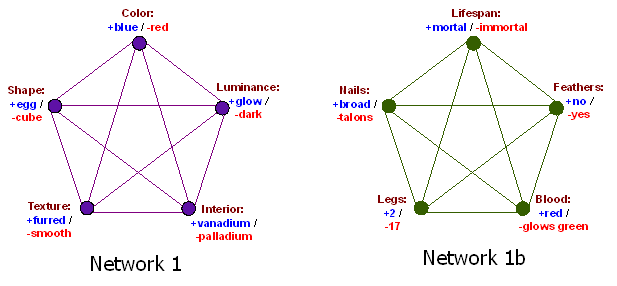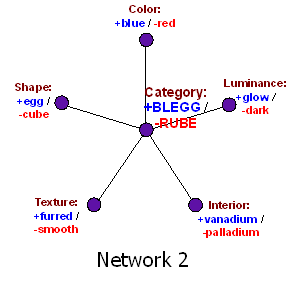Thus it doesn't tell us what we need to know about the Hemlock.

Matt McAlister's List: Less Wrong 2 - A Human's Guide to Words
-
-
A word fails to connect to reality in the first place.
-
Your argument, if it worked, could coerce reality to go a different way by choosing a different word definition.
-
-
-
"How?!" cried the jester in horror, as he was dragged away. "It's logically impossible!"
"It is entirely possible," replied the king. "I merely wrote those inscriptions on two boxes, and then I put the dagger in the second one."
-
-
-
The fundamental problem with arguing that things are true "by definition" is that you can't make reality go a different way by choosing a different definition.
-
mere guessing. It wouldn't be, y'know, absolutely and eternally certain. The Greek philosophers - like most prescientific philosophers - were rather fond of certainty.
-
-
May 29, 10
Choose your definitions wisely: they alter the way you think in (often) imperceptible ways.
-
So I say "blue", with a dutiful patina of humility. For I am a sophisticated rationalist-type person, and I keep track of my assumptions and dependencies - I guess, but I'm aware that I'm guessing... right?
-
But when a large yellow striped feline-shaped object leaps out at me from the shadows, I think, "Yikes! A tiger!" Not, "Hm... objects with the properties of largeness, yellowness, stripedness, and feline shape, have previously often possessed the properties 'hungry' and 'dangerous', and thus, although it is not logically necessary, it may be an empirically good guess that aaauuughhhh CRUNCH CRUNCH GULP."
-
-
-
To give an "intensional definition" is to define a word or phrase in terms of other words, as a dictionary does. To give an "extensional definition" is to point to examples, as adults do when teaching children.
-
In Hollywood Rationality and popular culture generally, "rationalists" are depicted as word-obsessed, floating in endless verbal space disconnected from reality.
-
-
-
We make complex tools to make complex tools, we use syntactical combinatorial language, we harness critical fission reactions as a source of energy: these things may serve out to single out only humans, but not all humans - many of us have never built a fission reactor.
-
No dictionary, no encyclopedia, has ever listed all the things that humans have in common.
-
-
-
"typicality effects" or "prototype effects"
-
if you ask subjects to press a button to indicate "true" or "false" in response to statements like "A robin is a bird" or "A penguin is a bird", reaction times are faster for more central examples.
-
-
May 30, 10
"Words are centers of (indefinitely extending) clusters rather than boundaries of sets."
-
This is the benefit of viewing robins as points in space: You couldn't see the linear lineup as easily if you were just imagining the robins as cute little wing-flapping creatures.
-
If you think that's extravagant, quantum physicists use an infinite-dimensional configuration space, and a single point in that space describes the location of every particle in the universe. So we're actually being comparatively conservative in our visualization of thingspace - a point in thingspace describes just one object, not the entire universe.
-
-
-
Why are you calling this object a "blegg"? A "blegg" was originally defined as blue and egg-shaped - the qualification of blueness appears in the very name "blegg", in fact. This object is not blue. One of the necessary qualifications is missing; you should call this a "purple egg-shaped object", not a "blegg".
-
You've got to expect a few color defects.
-
-
-
And suppose I'm fairly naive about ANNs: I've read excited popular science books about how neural networks are distributed, emergent, and parallel just like the human brain!!
-

-
-
-
A key idea of the heuristics and biases program is that mistakes are often more revealing of cognition than correct answers.
-
In one case, the question "Is it a blegg?" stands in for the disguised query, "Which bin does it go in?". In the other case, the question "Is it a blegg?" stands in for the disguised query, "Will it glow in the dark?"
-
-
-
Or Barry could be a skeptic who, upon hearing Albert's argument, reflexively scrutinized it for possible logical flaws; and then, on finding a counterargument, automatically accepted it without applying a second layer of search for a counter-counterargument; thereby arguing himself into the opposite position.
-
if Barry didn't have a differing intuition before, he sure has one now.
-
-
-
Telepathy, or "language", or whatever you want to call our partial thought transfer ability, is more complicated than it looks.
-
But it would be quite inconvenient to go around thinking, "Now I shall partially transduce some features of my thoughts into a linear sequence of phonemes which will invoke similar thoughts in my conversational partner..."
So the brain hides the complexity - or rather, never represents it in the first place - which leads people to think some peculiar thoughts about words.
-
-
-
Not all definitional disputes progress as far as recognizing the notion of common usage. More often, I think, someone picks up a dictionary because they believe that words have meanings, and the dictionary faithfully records what this meaning is.
-
Dictionary editors read what other people write, and record what the words seem to mean; they are historians. The Oxford English Dictionary may be comprehensive, but never authoritative.
-
-
-
It's not just that I can vary the label, but that I can get along just fine without any label at all - the rules for Aristotelian classes work purely on structures like [A, C, D]. To call one of these structures "zawa", or attach any other label to it, is a human convenience (or inconvenience) which makes not the slightest difference to the Aristotelian rules.
-
All [mortal, ~feathers, bipedal] are mortal.
Socrates is a [mortal, ~feathers, bipedal].
Therefore, Socrates is mortal.
-
-
-
Clearly, since one says "sound" and one says "~sound", we must have a contradiction, right? But suppose that they both dereference their pointers before speaking
-
Now there is no longer an apparent collision - all they had to do was prohibit themselves from using the word sound.
-
-
-
find a way of describing without the standard concept-handle
-
What does it take to play the rationalist version of Taboo, in which the goal is not to find a synonym that isn't on the card, but to find a way of describing without the standard concept-handle?
-
-
-
I was told that so long as I prayed in Hebrew, I didn't need to know what the words meant, it would work anyway.
-
As you read this, some young man or woman is sitting at a desk in a university, earnestly studying material they have no intention of ever using, and no interest in knowing for its own sake.
-
-
-
The only life-size, atomically detailed, 100% accurate map of California is California. But California has important regularities, such as the shape of its highways, that can be described using vastly less information - not to mention vastly less physical material - than it would take to describe every atom within the state borders.
-
#Good
-
-
A paper map of California, at a scale of 10 kilometers to 1 centimeter (a million to one), doesn't have room to show the distinct position of two fallen leaves lying a centimeter apart on the sidewalk. Even if the map tried to show the leaves, the leaves would appear as the same point on the map; or rather the map would need a feature size of 10 nanometers, which is a finer resolution than most book printers handle, not to mention human eyes.
-
-
-
It was Karl Landsteiner's discovery of this fact, and how to test for compatible blood types, that made it possible to transfuse blood without killing the patient. (1930 Nobel Prize in Medicine.)
-
The stereotypes must have arisen strictly from the mere existence of the labels.
-


